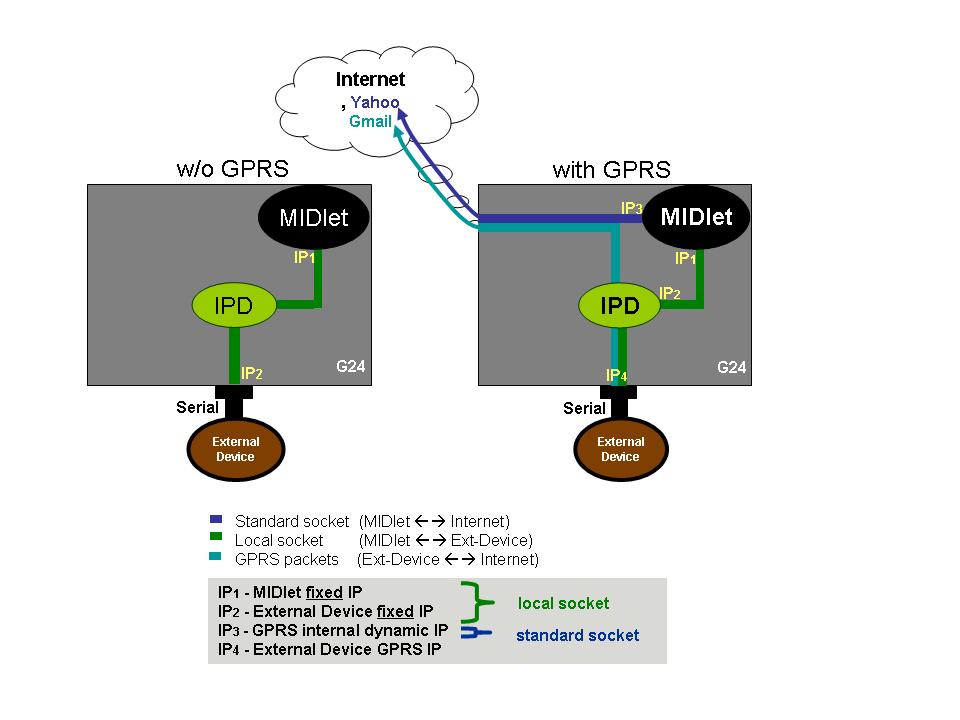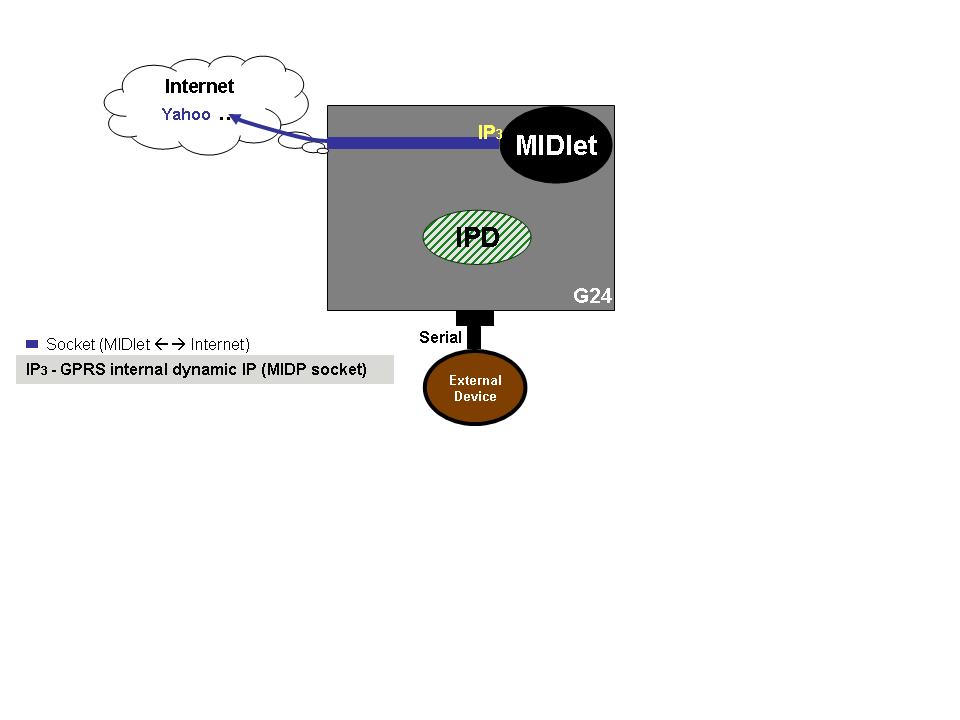|
|||||||||
| PREV PACKAGE NEXT PACKAGE | FRAMES NO FRAMES | ||||||||
See:
Description
| Interface Summary | |
|---|---|
| IpDirectorAvailabilityListener | A listener for IP Director(IPD) state changed event. |
| Class Summary | |
|---|---|
| LocalSocketManager | Local sockets managment. |
IPD - IP Director. Enables local socket service over a Serial connectivity. It directs IP packets from/to an External device to/from the MIDlet.
Opening a Local socket depends on the IPD state. The IPD is controled and configured by the External device using certain AT commands.
Read the below IPD states section in order to understand this dependancy.
To learn more about how the External device can activate/deactivate the IPD, please refer G24 User Guide.
LocalSocketManager.IPD_STATE_ACTIVE, the IPD will take care of the local socket's (IP) packets routing (directing) between the MIDlet and the External Device's application.
LocalSocketManager.IPD_STATE_INACTIVE, 
here as a NetBeans project.
IpDirectorAvailabilityListener.
//----------------------------------------------------------------------------
// MIDlet
// FILE: IpdSocketsMIDlet.java
// Description: Simply creates an IPD listener thread.
//----------------------------------------------------------------------------
package lsockets;
import javax.microedition.midlet.MIDlet;
// Listens on IPD state changed event.
//Once IPD state turns to ACTIVE, MIDlet opens 3 local sockets
public class IpdSocketsMIDlet extends MIDlet {
public IpdSocketsMIDlet() {
System.out.println("MIDlet: IpdSocketsMIDlet is initializing...");
}
public void startApp() {
// create listener thread
new IpdListener();
}
public void pauseApp() {
}
public void destroyApp(boolean unconditional) {
}
}
|
//----------------------------------------------------------------------------
// Listener implements IpDirectorAvailabilityListener interface
// FILE: IpdListener.java
// Description: Listens on IPD state changed event.
// Once IPD state turns to ACTIVE, 3 local sockets are opened.
//----------------------------------------------------------------------------
package lsockets;
import com.motorola.oem.ipd.IpDirectorAvailabilityListener;
import com.motorola.oem.ipd.LocalSocketManager;
public class IpdListener implements IpDirectorAvailabilityListener {
// 3 sockets:
private ServerSocketTcp sst = null;
private ServerSocketUdp ssd = null;
private ClientSocketTcp cst = null;
static boolean socketsInitialized = false;
public IpdListener() {
System.out.println("MIDlet: IpdListener is initializing...");
// set this class as IPD listener
LocalSocketManager.setIpDirectorListener(this);
if(LocalSocketManager.getIpdState() == LocalSocketManager.IPD_STATE_ACTIVE) {
openSockets();
}
}
// implement handler
public void onIpdStateChanged(int newIpdState) {
System.out.println("IpdListener: IPD State Changed to "+newIpdState);
switch(newIpdState){
case LocalSocketManager.IPD_STATE_ACTIVE:
if(!socketsInitialized){
openSockets();
}
break;
case LocalSocketManager.IPD_STATE_INACTIVE:
if(socketsInitialized){
closeSockets();
}
break;
default :
break;
}
}
// open local sockets
public void openSockets() {
// Open a TCP server thread listening on the local port
sst = new ServerSocketTcp(LocalSocketManager.getListenPort());
// Open a UDP server thread listening on the local port
ssd = new ServerSocketUdp(LocalSocketManager.getListenPort());
// Open a TCP client thread to the external device's IP on port
// 5678(remote server's port).
cst = new ClientSocketTcp(LocalSocketManager.getRemoteAddress(), 5678);
socketsInitialized = true;
}
// close all local sockets
public void closeSockets() {
System.out.println("IpdListener: closeSockets() entered");
if(sst != null ){sst.close(); sst = null;}
if(ssd != null ){ssd.close(); ssd = null;}
if(cst != null ){cst.close(); cst = null;}
socketsInitialized = false;
}
}
|
|
|||||||||
| PREV PACKAGE NEXT PACKAGE | FRAMES NO FRAMES | ||||||||